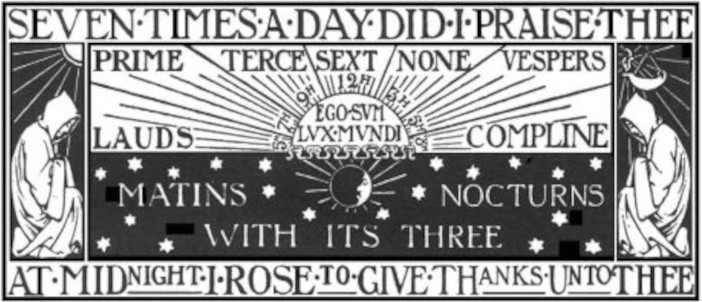On Tuesday, July 26, our LifeSpring small group discussed prayer. Bruce handed out a prayer bookmark that we used once at LifeSpring, and the group also talked about fixed hour prayer. This blog article is from about 5 years ago, and it is a discussion of fixed hour prayer. We hope this will be inspiring and useful.
Seven Times to Pray
Pausing for prayer at set times during the day is a universal practice. Muslims are well known for their calls to prayer issued by
People in monastic communities are known for their discipline in keeping the hours. Although this is clearly an easier practice for them than for a person who has children to tend, a job to show up for, and other daily responsibilities. Nevertheless, this practice is worth
The Bible has some interesting, but brief references to time-ordered prayer. One of the most famous is the reference in Daniel 6:10-11 to Daniel’s practice of praying three times a day. The psalmist in Psalm 55:17 said, “…I will call on God; Morning, noon, and night I cry out in my distress….“
A Model for Praying
The most common set times for prayer are the following: Night Watch (midnight), Awakening Hour (dawn), Blessing Hour (midmorning), Hour of Illumination (noon), Wisdom Hour (mid-afternoon), Twilight Hour (early evening), and the Great Silence (bedtime). These times developed in monastic communities where people devote their lives to this practice.
The Night Watch
This prayer time is also called vigils, and it occurs around midnight. The Night Watch advocates for others in a “dark night of the soul.” Perhaps when you get up to pray, something will turn over in someone’s heart and find its voice all because of your small prayer. Psalms to read: Psalm 42, 63, and 119:145-152.
The Awakening Hour
This prayer occurs at dawn, at the beginning of the day. The Awakening Hour includes thankfulness for a new day and prayer for a fresh slate. This is a prayer for a day lived well, for Jesus’ glory in our lives, and to give the day to God as an offering of praise. Psalms to read: Psalm 19, 95 and 147.
The Blessing Hour
This mid-morning pause has two emphases: the first is mindfulness of the Spirit’s abiding presence, and the second is about the sacredness of our hands and work for the day. Kahlil Gibran said, “Work is love made visible.” This prayer looks at the opportunity that work affords us to show love to those we serve. Psalms to read: Psalm 67, 84, and 121.
The Hour of Illumination
At midday, prayer honors the hour when Jesus embraced the cross (Matthew 27:45). In Illumination we pray for our lives to be given away as Jesus gave his away for us. We pray for Jesus to send light into our hearts so that we can make enlightened decisions that protect us from deceit, despair, and hatred. Psalms to read: Psalm 24, 33, and 34.
The Wisdom Hour
At mid-afternoon, the Wisdom Hour embraces the ideas of surrender, forgiveness, wisdom, and the impermanence of this life. It is the hour that Jesus gave up His spirit (Mark 15:34). This prayer is the prayer for wisdom to help us live like we are dying, which we are. Imagine the risks we would take, the love we would share, and the dreams we would chase if we lived this way. Psalms to read: Psalm 71, 90, and 138.
The Twilight Hour
This hour is also called vespers, the much-loved evening prayer. The main themes are gratitude and serenity as the evening falls. In this
The Great Silence
This prayer concludes the day and is a good time to pray with children or a spouse or a friend before sleep. It is also called
How to Use This Guide
This is meant to be a suggestion or a starting place for thinking about one’s prayer life and how you might go about making changes to it. Do not regard it as something you have to adopt fully or without testing. I would suggest the following:
- Determine which of the seven prayer times is most compatible with your daily schedule. For example, if you are sawing logs at midnight, The Night Watch might not be possible for you and will doom you to failure if you attempt it.
- Start with one or two prayer times. Jot them down on a card that you can keep with you. Include a few phrases, on the card, from the assigned Psalms that are meaningful to you. Let them inspire you and remind you.
- Keep the prayer times short. If you’re at work during one of your prayer times, consider it a success if you pause only one minute to focus on that prayer’s theme and ask briefly for the Lord’s help.
- Add prayer times one-at-a-time as you ease into this practice. Don’t gag yourself by attempting something impossible.
- Learn from your experience and tweak your practice to make it more and more useful to you. Let God be the source of your confidence and your persistence.

